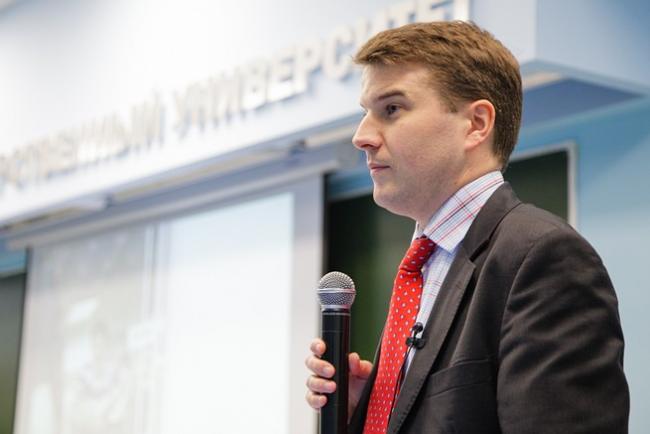The speech of the guest of the project "Lectures at the Polytechnic" was devoted to environmental legislation in force at the level of the EU member states
As part of the project "Lectures at the Polytechnic" on February 13 at Vyatka State University with the topic "Environmental threats to the world and law: is there a way out?" Doctor of Law, Professor of the University of Hasselt (Belgium) Bernard Vanheusden spoke.
A lawyer dealing with legal regulation in the field of environmental protection came to Kirov for the first time to share his experience and knowledge in the field of environmental law with students and teachers of the Faculty of Law of Vyatka State University. Everything that the lecturer spoke about, the audience took with interest, with the understanding that there are problems that concern everyone in all countries.
Prior to his evening speech, Bernard Vanheusden gave an interview to the Devyatka.ru website, STS-9 channel and Vyatka State University Stud-TV, where he emphasized three reasons for coming: firstly, Kirov is the city where his doctoral student lives; secondly, Vanhuysden is officially authorized by the Rector of the University, Luc De Schepper, to sign the Framework Agreement between Vyatka State University and the innovative University of Hasselt for cooperation >>; thirdly, he had long wanted to visit Russia, to give lectures to Russian students. In addition, the professor held classes at the Faculty of Law, took part in a scientific and practical online conference.
The pathos of the lecture-presentation by B. Vanheusden was subordinated to the idea of the significance of environmental legislation in force at the level of the EU member states. Enthusiastically and in perfect English (let's also give credit to our simultaneous interpreter, senior lecturer of the Department of Foreign Languages Andrey Kibishev), the professor told what Europeans are concerned about in the field of environmental protection and directives regulating problems. As it turned out, the environmental legislation of the European Union covers such areas as the elimination of the consequences of industrial accidents, strategic environmental planning, assessment of the impact of new projects on the environment, access to environmental information, public participation in legislative decision-making, water resources, air quality, waste, protection of wildlife nature, emissions trading and much more.
Listeners, for example, learned that Europeans do not allow the disposal of biodegradable waste, obediently dispose of garbage (by 2030, the recycling volume will reach 70%, specifically glass, paper, plastic, metal - 80%) and in case of non-compliance with the law they pay fines (the highest in history environmental fine - 40 million euros - paid by the Italians). Environmental legislation is strict and binding on all EU member states without exception.
Mr. Vanhuisden made no secret of the fact that Europe is striving for energy independence and for this purpose sets the task of developing renewable energy sources (in particular, Belgium is mainly interested in large wind turbines). And, of course, the whole world today is under the threat of climate change, which affects the quality of air, water and, by and large, the survival of mankind.
The guest's lecture was practically divided into two parts equal in time - the actual lecture-presentation and questions and answers. The audience was interested in the problem of public influence on the adoption of laws in the field of ecology and the question of why some countries did not accept the Kyoto Protocol?
- When the population feels that the votes of citizens are taken into account when making decisions, then the system works. And the rejection of the Kyoto Protocol by some countries is due to the fact that some business structures did not allow it to be done.
Answering the question about environmental crimes most common in Europe, the expert answered briefly: sewage, illegal dumps.
A question about his assessment of the implementation of the destruction of chemical weapons and environmental education in Europe, Vanheusden commented as follows:
- "There are almost no chemical weapons left in Europe. We cannot interfere in the curricula, all this remains within the competence of the participating countries. We cannot impose anything, perhaps that is why there is no special environmental education."
To the question of the rector of VyatSU, Valentin Nikolaevich Pugach, "are the financial capabilities of the participating countries taken into account in the resolution of the European Union?" Vanhuisden replied:
- "This is taken into account, but it should be kept in mind that European laws are the same for everyone. With all the flexibility of the approach, there should not be any differences in the end."
There was an impression of a strictly regulated "ecological lifestyle" in Europe when information was revealed that medicines that had expired were taken in pharmacies. Batteries are returned to stores where they are sold. Organic waste is put into a green (and no other) bag, and that the division of garbage is a manifestation of the social maturity of citizens, their ecological culture.
In Russia, not like in Europe. We have a clear "garbage postmodernism" - everything in everything. But those present, I believe, were glad that in our region (and in Russia as a whole) there are still forests, clean air, clean water bodies, and bottled water is much cheaper; that our open spaces and nature are the non-devaluable capital of the state and its citizens. It remains only to protect these riches.
… Concluding the photo session with the audience, Vanhuisden wished the students and young teachers to travel more and invited them to the city of Hasselt.
Natalya Ivanovna Pospelova,
project manager "Lectures at the Polytechnic",
Dean of the FGSN
Read in Russian
Оur university

Professor Vanheusden: "What ends up in the garbage bag is monitored by the citizens themselves"
- 18 February 2015, 10:58
- Author: admin
- Views 2372
The speech of the guest of the project "Lectures at the Polytechnic" was devoted to environmental legislation in force at the level of the EU member states
